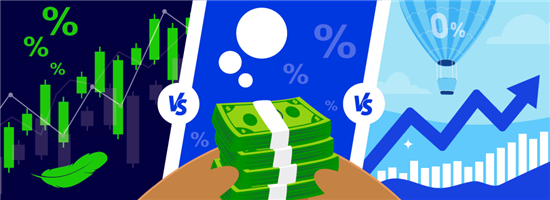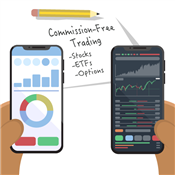Robinhood vs Public vs Webull: Which Should You Use?
Robinhood, Public, and Webull are all great options for growing your money. But which one will suit you the most?
 |
Robinhood, Public, and Webull all let you invest your money in a variety of assets. However, depending on your experience level and what you want to trade, one platform may fit your needs more.
For a full breakdown and direct comparison of all three platforms, read on.
Fund and Get 4% Match Bonus
Enroll in this offer, and transfer or deposit $100,000 or more to your Webull account. Maintain a total net qualifying funding amount of $100,000 or more until the payment date of the final installment of the match bonus. The match bonus will be paid in 6 installments. The first installment will be issued on or about May 15, 2026.
Who Each Is Best For
- Robinhood is best for investors who are just starting out or don't have a lot of capital to invest. You can trade for as little as $1 with a clean, beginner-friendly UI. Find out more
- Public is best if you want to get investing ideas from fellow investors. It's also good if you want to invest in theme-specific assets. Find out more
- Webull is best for active traders and more experienced investors. The platform is known for its advanced charting and technical analysis tools. Find out more
What All Three Offer
- Commission-free trades
- No account minimums
- Stocks and ETFs (no mutual funds, or forex)
- Fractional shares available
- Highly rated mobile apps
How They're Different
- Public also offers alternative investments like treasuries, royalties from intellectual property, fine art, and more.
- Robinhood and Public are more beginner-friendly while Webull caters to more experienced or active traders.
Why Choose Robinhood?
Robinhood offers 100% commission-free trading. You can invest in stocks, ETFs, options, and cryptocurrencies for as low as $1. This makes it perfect for new investors who want to start with small amounts.
Robinhood also offers an IRA with a match on top of your annual contribution limits.[2] This gives you a nice little boost to your retirement savings.
For more experienced investors, they have a premium account called Robinhood Gold at $5/month. With it, you get bigger instant deposits, more advanced research tools, and an even higher percentage match on your IRA contributions.
Robinhood has over 20 million users. The app is very beginner-friendly and highly-rated on both Google Play and App Store.
Drawbacks:
The biggest drawback of Robinhood is that its research isn't as extensive as the other options.
You get access to professional research from Morningstar with Robinhood Gold, but you'll need to pay their monthly fee for that. Even then, it's not as extensive as Webull's array of tools.
|
|
Why Choose Public
Public is unique because of its social media platform, thematic investing, and alternative investments. It's tailored for beginners and social investors.
Besides stocks, Public also lets you invest in alternative assets like fine art and collectibles. Some examples include rare sneakers, trading cards, and even artwork from Banksy. You can even invest in royalties on intellectual property like music.
Public has a social community where you can follow popular traders and share ideas with other investors. This makes the whole process more inclusive, educational, and collaborative.
Public's thematic investing allows you to invest in themes that you like. Each theme contains ETFs that reflect the topic, so you can easily invest in companies that align with your values.
Drawbacks:
Public lacks research and analysis tools. It doesn't have any charting tools, stock screeners, or any other stock evaluation tools.
|
|
Why Choose Webull?
Webull is perfect for more advanced, active traders. It offers commission-free trades on stocks, ETFs, and options.[4] This makes it ideal for those who make frequent transactions.
On top of that, they offer widely praised advanced charting tools and stock screeners. They also have great technical analysis tools to help you make your investment decisions.
Webull has features for different types of traders:
- For day traders: Perform up to 3 day trades in a five-trading day period (unlimited for those with $25,000 or more in account balance).[5]
- For margin traders: Get access to margin trading at no extra cost and up to 4x buying power (you need at least $2,000 to qualify).[6]
- For short sellers: Short selling is supported on Webull.
Webull is also the only platform among the three that offers a paper trading account. You get unlimited virtual cash and real-time market data, so you can test your strategies before committing real money.
Drawbacks:
If you're a complete beginner, you may find all the research tools overwhelming. All the charts and screeners could scare you away from trading completely.
|
|
Webull and Public cater to two very different types of traders. If you're just starting out and learning the ropes, Public may be a better option for you. If you like diving deep into research and stock evaluation reports before investing, Webull is the way to go.
Direct Comparison
To give you a better idea of which platform will suit your trading style, here's a direct comparison between Robinhood, Public, and Webull.
Fees
 |  |  | |
| Visit Site | Visit Site | Visit Site | |
Robinhood | Public.com | Webull | |
|---|---|---|---|
Get a Free Stock (worth between $5 and $200) - | Commission Free Stock Trading - | Fund and Get 4% Match Bonus - | |
| Stock Trading | |||
| Options Trading | |||
| Cryptocurrency Trading | |||
| Annual Fee | |||
| Inactivity Fee | $3.99 every month (accounts with less than $70 in total value and no activity over the last 6 months) | ||
| Maintenance Fee | |||
| Visit Site | Visit Site | Visit Site | |
Robinhood: Pricing information from published websites as of 01/25/2025. | |||
All platforms offer commission-free trading. They're also all completely free to start using. All you need to do is sign up and create an account, and you're ready to trade.
It's worth noting that with Public, there are a few extra charges. If you want extended trading hours, each trade will cost you $2.99 per trade. OTC trades will also cost $2.99. But if you're a Premium member, these charges are waived.
Robinhood and Public also offer premium accounts. Robinhood Gold will cost you $5 a month while Public Premium will cost you $10 a month.
For a complete breakdown, be sure to check out their fee schedules:
Neither of the two platforms charges trading fees. Unless you're subscribing to Robinhood's premium account (Robinhood Gold), both Robinhood and Webull are free to start using.
Minimum Investment
None of the three platforms require any minimum investments or account minimums. They also all offer fractional shares. This means you start with as little as a few dollars.
Robinhood and Public start their fractional shares for as low as $1. Meanwhile, Webull starts its shares at $5.
Ease of Use
Robinhood is specially designed for beginner investors. Not only do they have commission-free trading and fractional shares as low as $1, they also have an incredibly intuitive user interface.
Public is also a great choice for beginners who aren't sure what to invest in. You can follow the moves of your favorite traders or choose your investments based on what you personally believe in.
Since Webull is geared more toward active traders, it may not be suitable for most beginners. Although they have a paper trading account for newbies to use, the advanced research tools could be a little overwhelming for those just starting out.
If you want to be hands-off, you could try Webull's Smart Advisor. It will automatically invest for you based on your preferences.
Tradable Assets
| Robinhood | Public | Webull | |
|---|---|---|---|
| Stocks | ✔ | ✔ | ✔ |
| ETFs | ✔ | ✔ | ✔ |
| Options | ✔ | ✔ | ✔ |
| Cryptocurrency | ✔ | ✔ | - |
| Mutual funds | - | - | - |
| Bonds | - | ✔ | ✔ |
| Fixed income funds | - | - | - |
| US Treasurys | - | ✔ | - |
| Royalties | - | ✔ | - |
| Alternative assets | - | ✔ | - |
All three platforms let you invest in stocks, ETFs, and options. Robinhood and Public also offer crypto.
What makes Public unique is that it lets you invest in royalties (like music) and alternative assets (like fine art or collectibles). These are great ways for you to diversify your portfolio.
Plus, you can earn passive income on assets that behave independently from traditional markets.
Unfortunately, none of the platforms offer mutual funds, or fixed income funds.
Account Types
| Robinhood | Public | Webull | |
|---|---|---|---|
| Individual taxable account | ✔ | ✔ | ✔ |
| Joint account | ✔ | - | ✔ |
| Traditional IRA | ✔ | ✔ | ✔ |
| Roth IRA | ✔ | ✔ | ✔ |
| Margin account | ✔ | ✔ | ✔ |
| 529 College Savings | - | - | - |
| Health Savings Account | - | - | - |
| Account for minors | - | - | - |
| Robo-advisor | ✔ | - | ✔ |
| Cash management account | ✔ | ✔ | ✔ |
| Paper trading account | - | - | ✔ |
If you're looking for a retirement account, Robinhood and Public offer a unique IRA match on your contributions, transfers, and rollovers. The match doesn't count toward your annual contribution limits, and there's no cap to how much you can earn.
Meanwhile, if you'd like to practice first, Webull has a paper trading account. This lets beginners simulate trades with unlimited virtual money and real-time market data.
1% Match on IRA
Earn 1% IRA match on all eligible contributions to your Robinhood IRA. Terms and conditions apply. This is a limited-time offer.
3% Match on IRA with Robinhood Gold
Earn 3% IRA match on all eligible contributions with Robinhood Gold. Terms and conditions apply. This is a limited-time offer.
Trading Platform
All three platforms let you trade via web browser or mobile app.
In addition, Webull also has a desktop app that's open to everyone. It's fully customizable to set it up the way you want. You can set up watchlists, customize charts with smart drawing tools, place orders, and more.
Although Robinhood and Public don't offer desktop apps, you can make trades via web browser using their clean, beginner-friendly UIs.
- Robinhood: 24/5 from Sunday 8 pm ET - Friday 8 pm ET (currently rolling out and isn't available to all users yet)
- Public: Pre-market: 4:00-9:30 am ET; After-hours: 4:00-8:00 pm ET (fees apply for non-Premium members)
- Webull: Pre-market: 4:00-9:30 am ET; After-hours: 4:00-8:00 pm ET
Order Types
| Order Type | Robinhood | Public | Webull |
|---|---|---|---|
| Market order | ✔ | ✔ | ✔ |
| Limit order | ✔ | ✔ | ✔ |
| Stop limit | ✔ | ✔ | ✔ |
| Stop loss | ✔ | ✔ | ✔ |
| Trailing stop loss | ✔ | - | ✔ |
| Trailing stop limit | - | - | ✔ |
| One-triggers-the-other (OTO) | - | - | ✔ |
| One-cancels-the-other (OCO) | - | - | ✔ |
| One-triggers-an-OCO (OTOCO) | - | - | ✔ |
Robinhood and Public only provide the most basic types of orders. This is why they're better suited for beginners with simpler investment approaches.
Webull, on the other hand, provides more advanced conditional orders. These allow you to set order triggers for stocks and options based on price movement. This gives experienced investors more control over their trades to mitigate risk.
Market orders execute right away, no matter what the price is. Limit orders, on the other hand, will let you set the price and the trade will execute once the share hits that price. This means limit orders aren't guaranteed to be executed, but may get you a better price.
Educational And Research Tools
Webull has the most advanced research tools, while Public's tools are the most basic. Here's a breakdown:
Robinhood
Because it's made with beginners in mind, Robinhood only has the basic research tools like:
- Side-by-side stock comparisons and stock filters
- Real-time market updates on stocks in your watch list
- Candlestick charts with 5 indicators
- Prices paid by Robinhood investors (per share)
If you have a Gold account, you'll get access to professional research from Morningstar. These include in-depth stock research reports, covering over 1,700 stocks, and are frequently updated.
- Business strategy - initiatives a company takes to create value
- Economic moat - ability to maintain an edge over its competitors
- Fair market value - the price the company would sell for on an open market
- Risk - probability of losing parts or all investments in the company
- Leadership - the company's management
Public
The basic Public account doesn't have any research tools (just a Learn page for beginners).
If you subscribe to Public Premium ($10/month), you get access to:
- Detailed performance metrics that track stocks and ETFs with unique KPIs and essential data (subscriber growth, cash flow, operating costs, and more)
- Professional research from Morningstar for all popular stocks and reports on competitive pressures, business strategies, and more
- Weekly market breakdowns on recent headlines, sector-wide trends, and key economic reports from Public's editorial team
- Exclusive audio content from expert analysts that breaks down trending stories
Webull
Webull has the most extensive selection of advanced research and charting tools. These will help you do in-depth research and better decide which assets fit your methodology. These tools include:
- Real-time market quotes
- Price alerts (for stocks on your watchlist)
- Stock screeners
- Market data from 5 categories and 100+ exchanges
- 60+ technical indicators
- Analyst ratings
- Video replay (for historical stock price action)
Webull's learn section also offers educational resources like webinars, tutorials, and articles that span a wide range of topics.
If you need advanced research tools or a paper trading account to practice with, Webull is a better option. If you're a beginner or don't have a lot of capital to start with, Robinhood's user-friendly interface and cheap fractional shares may be better suited for you.
Security/Compliance
Robinhood, Public, and Webull are all SIPC-insured. This means up to $500,000 (including a $250,000 cash limit) is insured in case the brokerage fails.[7]
All three platforms also have supplemental coverage for amounts that exceed SIPC limits. Robinhood uses Lloyd's of London while Public and Webull use Apex Clearing for its extra coverage.
All three platforms also have data encryption, security protocols, and two-factor authentication (2FA) that protect all your private and personal data.
In terms of compliance, all three platforms have regulatory oversight. They all also comply with KYC/AML laws.
Know Your Customer (KYC) refers to checks that companies make to ensure that their customers are who they say they are and aren't a risk to the business. Anti-Money Laundering (AML) refers to the steps that companies take to prevent criminals from transferring funds that came from illicit activity.
Customer Support
All three platforms have available customer support to help you with any concerns or questions you may have:
- Robinhood: 24/7 via live chat and phone[8]
- Public: 24/7 via in-app chat, web chat, and email. You can also contact them on their socials or via snail mail.[9]
- Webull: via email and phone every Monday through Friday, 9AM-4:15PM EST[10]
Mobile App
Here's a quick overview of their ratings on the mobile app stores:
| Robinhood | Public | Webull | |
|---|---|---|---|
| Google Play rating (no. of reviews) | 4.2/5 stars (513,000+ ratings) | 4.4/5 stars (47,000+ ratings) | 4.5/5 stars (199,000+ ratings) |
| App Store rating (no. of reviews) | 4.3/5 stars (4.5+ million ratings) | 4.7/5 stars (75,600+ ratings) | 4.7/5 stars (314,300+ ratings) |
In terms of customer feedback, here are some comments from their app store reviews:
Robinhood
Public
Webull
Bottom Line
All three platforms offer similar services. However, each is suited for a specific type of investor.
If you're a complete beginner, Robinhood and Public are great options for you. However, your decision between the two will depend on what specific asset you want to trade as well as your investment preferences.
If you're an active or more experienced trader, Webull has the best charting tools and screeners to suit your fast-paced style.
Either way, you can't go wrong with any of these options. What will matter the most is how and what you want to trade.
References
- ^ TechCrunch. Robinhood App Will Offer Zero-Commission Stock Trades Thanks To $3M Seed From Index and A16Z, Retrieved 10/16/2023
- ^ Robinhood. IRA match FAQ, Retrieved 04/05/2025
- ^ The New York Times. Robinhood is fined $70 million over misleading customers and system outrages, Retrieved 10/16/2023
- ^ Webull. Why Webull?, Retrieved 04/05/2025
- ^ Webull. Margin And Cash Account: Key Differences, Retrieved 04/05/2025
- ^ Webull. Margin Trading, Retrieved 04/05/2025
- ^ SIPC. What SIPC Protects, Retrieved 04/05/2025
- ^ Robinhood. How to contact support, Retrieved 04/05/2025
- ^ Public. Contact our Member Support team, Retrieved 04/05/2025
- ^ Webull. Who We Are?, Retrieved 04/05/2025
Fund and Get 4% Match Bonus
Enroll in this offer, and transfer or deposit $100,000 or more to your Webull account. Maintain a total net qualifying funding amount of $100,000 or more until the payment date of the final installment of the match bonus. The match bonus will be paid in 6 installments. The first installment will be issued on or about May 15, 2026.
$20 Investment Bonus
- Open an Acorns account (new users only)
- Set up the Recurring Investments feature
- Have your first investment be made successfully via the Recurring Investments feature
Invest in Real Estate with $10+
- Only $10 minimum investment
- Get a diversified portfolio of real estate projects across the US
- Open to all investors
Write to Iggi Vargas at feedback@creditdonkey.com. Follow us on Twitter and Facebook for our latest posts.
Note: This website is made possible through financial relationships with some of the products and services mentioned on this site. We may receive compensation if you shop through links in our content. You do not have to use our links, but you help support CreditDonkey if you do.
|
|
|
Compare:





